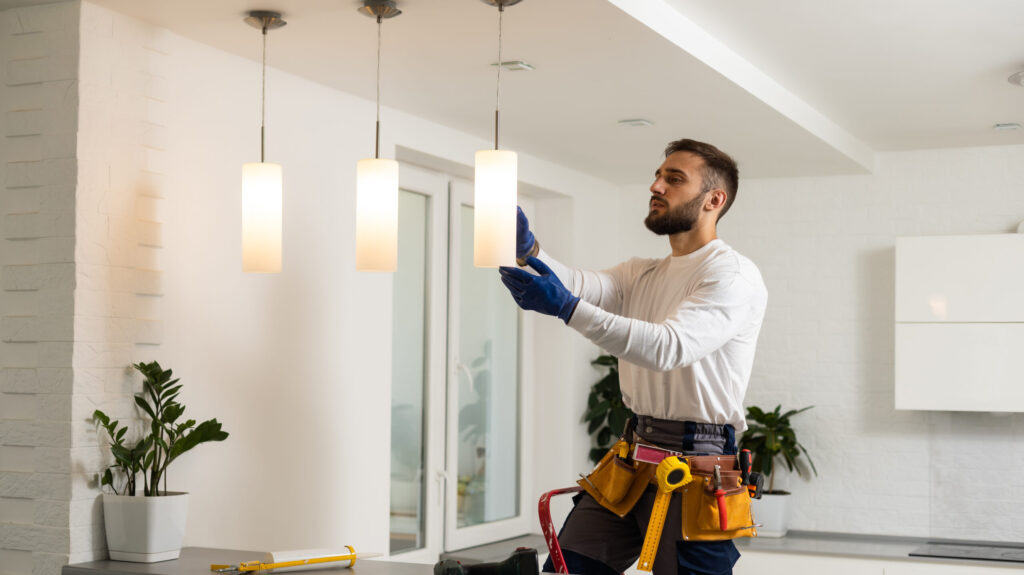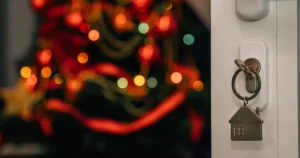In an era of rising energy costs and environmental concerns, homeowners are increasingly seeking ways to improve the energy efficiency of their residences. Thankfully, there are several do-it-yourself (DIY) improvements that can be made to enhance energy efficiency, reduce utility bills, and contribute to a greener planet.
Whether you’re looking to make improvements to make your current home more comfortable or to make your house more attractive to potential buyers, now’s the perfect time to tackle those DIY energy-saving projects you’ve been considering.
Not only will these upgrades help you save on your monthly bills, but they’ll also add value to your home. From simple fixes to slightly more involved projects, here’s a guide to get you started on your journey to a more energy-efficient and eco-friendly home.
Seal the Leaks:
One of the most cost-effective DIY improvement projects you can take on is sealing air leaks in your home. Gaps and cracks around windows, doors, and other openings can lead to significant energy loss, causing your heating and cooling systems to work harder than necessary. Use weatherstripping, caulking, and insulation to prevent drafts and maintain a comfortable indoor temperature.
Addressing air leaks not only enhances your home’s energy efficiency but also contributes to a more comfortable and healthier living environment. By effectively sealing those gaps and cracks, you’ll not only keep conditioned air from escaping but also keep pollutants and allergens from entering.
This can lead to improved indoor air quality, making your home a haven of freshness. Additionally, reducing the strain on your HVAC systems can extend their lifespan and decrease the frequency of maintenance, saving you both time and money in the long run.
Upgrade to LED Lighting:
Traditional incandescent bulbs consume more energy and have a shorter lifespan compared to LED bulbs. Switching to LED lighting is a simple DIY project that can significantly reduce your energy consumption and extend the life of your light fixtures. LED bulbs are available in various color temperatures to suit your preferences and can make a noticeable difference in your energy bills.
Not only do LED bulbs excel in energy efficiency and longevity, but they also offer versatility in lighting design that can transform the ambiance of your living spaces. With options ranging from warm, cozy tones to cool, bright hues, you can tailor the lighting to complement each room’s purpose and mood.
By making this simple switch, you not only contribute to a more sustainable future but also gain the ability to craft an atmosphere that suits your lifestyle and activities. So, whether you’re aiming to lower your carbon footprint or elevate your home’s aesthetic appeal, transitioning to LED lighting is a DIY endeavor that truly brightens both your living space and the environment.
Install Programmable Thermostats:
Regulating your home’s temperature efficiently is essential for energy savings. Programmable thermostats allow you to schedule temperature adjustments based on your daily routine, ensuring that heating or cooling is minimized when not needed. Installing and programming these thermostats is a straightforward DIY task that can lead to substantial energy savings over time.
In addition, programmable thermostats empower you to take greater control over your home’s comfort while reducing unnecessary energy consumption. By syncing your home’s temperature to your schedule, you can optimize comfort and minimize waste, striking the perfect balance between comfort and conservation.
Moreover, many modern programmable thermostats can be remotely controlled through smartphone apps, allowing you to make real-time adjustments even when you’re away. With this level of flexibility and energy management at your fingertips, investing a bit of time in installing and programming a programmable thermostat is a DIY effort that pays dividends in both convenience and eco-conscious living.
Enhance Insulation:
Improving insulation in your home is a more involved DIY project but offers significant long-term benefits. Proper insulation keeps your home comfortable year-round by minimizing heat transfer. You can add insulation to your attic, walls, and floors to create a thermal barrier that prevents excessive heat gain or loss, reducing your reliance on heating and cooling systems.
As an added benefit, enhanced insulation not only bolsters your home’s energy efficiency but also enhances its overall value and appeal. A well-insulated home isn’t just about temperature control; it’s about creating a cozy haven that resonates with potential buyers and occupants alike.
Maintain HVAC Systems:
Regular maintenance of your heating, ventilation, and air conditioning (HVAC) systems is crucial for optimal energy efficiency. Simple DIY tasks like cleaning or replacing air filters, cleaning the coils, and ensuring proper airflow can help your HVAC systems operate efficiently, reducing energy consumption and extending their lifespan.
By dedicating time to the routine maintenance of your HVAC systems, you’re not only ensuring peak energy efficiency but also safeguarding your investment in home comfort. Regular maintenance also minimizes the risk of unexpected breakdowns, which can not only be costly but also inconvenient, especially during extreme weather conditions. Just as a well-tuned engine runs smoother and lasts longer, a well-maintained HVAC system operates at its best, providing consistent temperatures without straining to do so.
Harness Natural Light:
Maximizing natural light through well-placed window treatments and utilizing reflective surfaces can help reduce the need for artificial lighting during the day. This not only enhances energy efficiency but also creates a pleasant and inviting living space. Consider adding mirrors or light-colored paint to amplify the effect of natural light.
By incorporating mirrors strategically, you can even create the illusion of more space, enhancing both the visual appeal and functionality of your rooms. Ultimately, this DIY approach to lighting not only harmonizes your living space with nature’s rhythms but also infuses your home with a sense of vitality and warmth that artificial lighting alone can’t replicate.
Water Efficiency Upgrades:
Reducing water consumption contributes to overall energy efficiency. Replace old faucets and showerheads with water-efficient models that maintain water pressure while using less water. Fixing leaks promptly and considering low-flow toilets are additional steps that can lead to both water and energy savings.
And when it comes to low-flow toilets, the impact is twofold: not only do they contribute to water conservation, but they also reduce the energy needed to treat and pump water through your plumbing system. By making these adjustments, you’re embracing a holistic approach to energy and resource efficiency, fostering a home environment that resonates with a more sustainable way of living.
In the pursuit of a more energy-efficient and sustainable future, homeowners hold the key to making a significant impact. Each step towards enhancing energy efficiency not only results in tangible savings on utility bills but also contributes to a greener planet.
From sealing air leaks and upgrading lighting to maintaining HVAC systems and embracing natural light, these DIY improvements empower us to create more comfortable, healthier living spaces while minimizing our environmental footprint.
As you embark on this journey, remember that even the smallest changes matter. And for those ready to take their energy-saving efforts to the next level, Mutual of Omaha Mortgage is here to help. Our financing options can turn your dreams of energy-efficient home upgrades into reality, making it easier than ever to invest in a brighter, more sustainable future.
Contact Mutual of Omaha Mortgage today and take the first step towards a home that’s not only efficient and comfortable but also a testament to your commitment to a more eco-conscious lifestyle. Your home, your future, and our planet will thank you.






